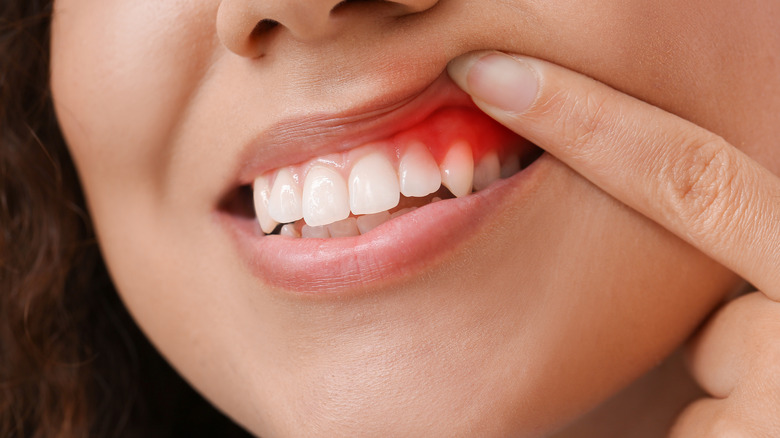What Does It Mean When Your Gums Are Swollen?
Brushing your teeth may seem like a mundane task, but when pain starts to make itself known, it's hard not to take notice. Pain may first be attributed to a sore tooth or a potential cavity forming, but sometimes it can actually stem from your gums.
Gums are an essential part of the soft tissue of your mouth, which line, surround, and protect the teeth by forming a seal around the top portion, per Much Hadham Dental Care. As well as shielding the teeth, the gums also prevent diseases from developing in your teeth and mouth by preventing bacteria from taking root and causing issues like gum disease, according to WebMD.
And the precursor of this condition is often swollen gums. And according to toothpaste brand Crest, the most common cause of inflammation is actually gum disease. However, there are other conditions and causes that result in swollen gums — especially if you use things like dentures or are receiving orthodontic treatment.
Swollen gums are a warning sign for a chronic inflammatory disease known as periodontitis
Swollen gums are often a sign that you may be suffering with the precursor to gum disease, gingivitis. According to Mayo Clinic, gingivitis is a "common and mild form" of gum disease that involves your gingiva, the part of the gum that covers the base of your teeth. If left untreated, this can lead to a more serious form of gum disease called periodontitis.
Described by the European Federation of Periodontology as a "chronic inflammatory disease," periodontitis can result in the destruction of bones that support your teeth and even tooth loss. Thankfully, if you spot the first stages of gum disease (i.e. swollen gums) you can stop it in its tracks before it progresses to periodontitis.
But swollen gums aren't always a sign of gum disease. Sometimes it can be as simple as brushing your gums too hard, according to Corsodyl, leading to gum abrasion, and mouth ulcers can sometimes appear on the gum line which can also cause inflammation.
Whatever the case may be, if the problem persists, booking an appointment with your dentist is your best port of call to figure out exactly what's going on.

